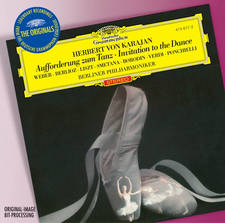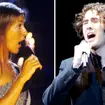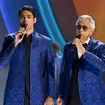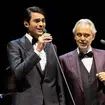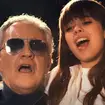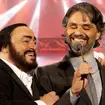Andrea Bocelli Has The Last Laugh
45 million. That’s how many records Andrea Bocelli has sold, most of them classical. His shelves are groaning with music-industry awards from around the world. Very few artists who sing for a living can compete with this level of commercial success. Even fewer have been more critically abused.
We’ve come to Bocelli’s home some 25 miles north of Pisa to talk to the tenor about the opera and the demanding role of Manrico. The west coast road is a seamless string of seaside restaurants and private beaches. Villa Bocelli is a Frisbee-throw away from the main drag, tucked down a discreet side road. It’s about as big as a medium-sized hotel. Huge electric gates surmounted by cruel razor wire are opened by a security man holding a keen-looking Doberman by the collar. Easy does it. Once inside the airy, white-walled rooms, we are greeted gaily by Veronica, Bocelli’s partner.
“Please help yourself. Look around. He will be down shortly.”
The two met at a party in Bologna. It was a coup de foudre. They started living together the next day. Bocelli’s two sons, Amos and Matteo, live with their mother close by.
You can hear the constant dull roar of the sea (or is it the traffic?) but the spacious ground-floor rooms are tranquil and full of light. There’s a magnificent old Steinway grand piano standing in the drawing room. Bocelli is led into the room and we are introduced. He is taller than I’d expected, but with the familiar four-day stubble and casual dress. I admire the piano. May I play it?
“Of course. I had it restored a few years ago to its original condition.”
Launching, for no particular reason into the theme of the last movement of Rachmaninov’s second piano concerto, I am suddenly joined by Bocelli lah-lahing along to the tune. His voice makes the room vibrate. Is this the “microphone tenor” bashed by the critics, the blind singer who can’t hit the other side of his own bathroom? I don’t think so. It sends a shiver up the spine. Surprising. Unexpected. Everyone smiles and claps.
“Beautiful tune,” he says. “It should be a song. Well, I will have some coffee and then we will do photographs and interview.” He disappears.
Half an hour later we track him down to a small room upstairs with a studio recording desk, computer, microphone and two recording engineers. They are listening, at deafening volume, to the demos Bocelli is working on for his next pop album, which may or may not appear later this year depending on whether he can find enough suitable material for it. The two songs we hear are the kind of nondescript, sentimental Euro-trash ballads that the Italian pop picker has been unable to resist for decades.
“Let’s talk about Trovatore,” I suggest at length.
“Yes,” replies Bocelli. “Much better. More interesting.”
We go downstairs.
Manrico, the hero of Verdi’s dark, intense opera, is a different proposition to the lyrical roles of Rodolfo and Cavaradossi on his previous full-length opera recordings, La Bohème and Tosca. It’s one of the most challenging in the repertoire. Why did Bocelli choose this particular role?
“You know, there are four or five operas that are the dream of every tenor in the world and Il Trovatore is certainly one of that number. It’s a fantastic opera which I think is well suited to my voice because it is sung on a fairly central tessitura, and it requires a lot of emotion, a lot of pathos and a style which I particularly like – the Verdi style of strength and character. Manrico requires that strength, that heroic character. That’s an aspect of something that I recognise in myself – that somewhat impetuous, impulsive nature.”
A tanned, white-haired woman in a black dress enters the room quietly and sits watching: Bocelli’s mother, Edi. Her husband, who worked in a bank, died three years ago. She sold agricultural machinery.
“She was incredible,” Veronica reveals later. “You’d go in to buy a lawn-mower and come out with a tractor!”
Edi nursed Andrea through the traumatic time when his eyes began to fail from glaucoma when he was a child. He was completely blinded as the result of a soccer match when he was 12. There was no musical gene in the family, no piano in the house, no more than a normal family’s interest in music. Yet by the age of six or seven, Bocelli knew all the arias from Il Trovatore.
“I didn’t like the whole opera then. That came much later. It didn’t take long to learn Manrico. You see, learning a part is easy but it is a different thing to have the part in your throat, as we say. For the difficult sections I use a Braille score, otherwise when I have something to study I have my pianist Carlo come to the house every day.”
He asks if I’ve heard the new recording. Not yet, I reply, only the aria Di Quella Pira (with Manrico’s celebrated top Cs) from Bocelli’s Verdi album of some years ago.
“No,” he says dismissively. “No, but it’s completely another thing now. Completely! I shall play the new Di Quella Pira for you later and you’ll understand what I mean. After hearing this new version, you’ll hear that my voice has changed in intensity and volume. And that’s just in three or four years. Also, I met a new coach with whom I studied an aspect of singing technique that enriches the voice enormously.
“It was poor because I hadn’t done any muscular exercises. The rest was always there – the intention, the musicality, the quality. All the things I wanted to express through singing were there originally. What was lacking was that intensity. Now there are muscles!” he exclaims delightedly.
“Muscles! There’s a whole kind of vocal journey that every artist must undertake,” he adds, “and a serious career can only be built step by step.”
But doesn’t the fact that he continues to run a parallel career as a pop singer continue to compromise his position? Isn’t it making it more difficult to be taken seriously as an opera singer? Bocelli’s response is persuasive.
“Why doesn’t anyone ask why collections of Caruso’s recordings contain more popular songs than opera arias? The same for Gigli. For a long time, all the major tenors sang popular songs. I’d rather ask why tenors today don’t do that – although many do. Cura, for example, has sung songs with Sarah Brightman, as I have.
“There are many others as well. Who were the two tenors who did a concert in New York’s Central Park recently? Marcelo Álvarez and Salvatore Licitra. There are recordings by Plácido Domingo with pop songs on them. So why is it only I who am not allowed to sing songs? Perhaps it’s because I sell rather too many of them.
“Not everybody can do this, just as not everybody can speak two languages. And after all, opera and pop are different languages. When I’m singing an opera recording I sing for the people who are furthest from the stage, 30 or 40 metres away from me. When I sing a song, I pretend I am singing into the ear of a child.”
So far, Bocelli has sung Werther, La Bohème, L’amico Fritz, Madame Butterfly, the Verdi Requiem and Tosca live.
“The problem is that most people who criticise me have not had the opportunity to hear me on stage in opera.”
Does the sniping in the music press irritate him – the accusations of being an opera singer who needs a microphone?
“I reply simply by saying I have never sung an opera with a microphone. Never. Nor with any kind of support like that. Initially it annoyed me but after a while I realised that one has to get used to this sort of thing because the opera world is like that. Then I heard Oscar Wilde’s famous aphorism: ‘People will forgive you anything, but not success’.”
Andrea Bocelli’s success is global. People love his voice. Forty-five million of them have said so with their hard-earned cash. The shrewd Tuscans who surround him have contributed to that success – probably the pasta, too, which he calls for as he makes his way for lunch – but the basis of the Bocelli phenomenon is best summed up in the words of the singer’s late friend, teacher and mentor, the tenor Franco Corelli who died only last year:
“His voice is full of pathos – a sweet and sad voice that really moves the public.”
